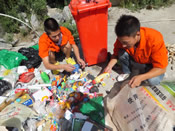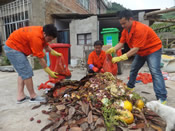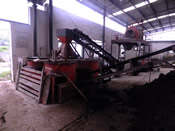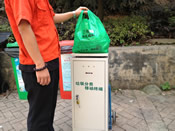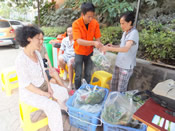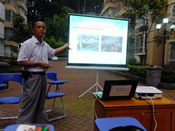|
Editor's note: Many have claimed that waste separation will not work in China because the Chinese do not have a strong environmental consciousness. Lan Yajun , founder of Shoufeiwang (Waste Recycling Web) of Guiyang City in Guizhou Province, doesn't agree. For a number of years he has been running a recycling business which makes a loss sometimes and at others makes a profit. Last year he started to recycle food waste using an innovative model to recycle garbage by combining material benefit with spiritual (moral) interest. He believes that this is the only way to keep his recycling business going. |

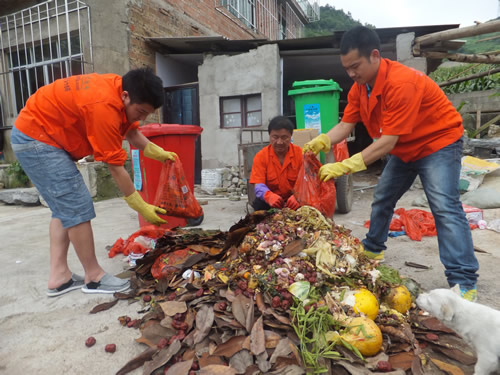 |
| Workers picking out organic garbage in the organic fertiliser processing plant. |
Lan Yajun was born in Sichuan. He majored in Business Management at Changzhou College of Engineering. He went to Guiyang to start a business in 2005 and launched the Guiyang Shoufeiwang in the same year. Eight years have passed and he has earned the title of 'garbage king' because of his garbage collecting business. In reality, however, he has never become a king from doing this business, which made a loss every year until the end of 2009. Today his business continues to see ups and downs. While Lan keeps up this struggle on which his livelihood depends, he has also fallen in love with the recycling business. He has grasped the meaning of his business apart from it being a commercial venture. Now his efforts to reduce garbage in order to protect the environment have become a means to realising his own value.
An accidental path to garbage recycling
Lan Yajun took up garbage recycling by accident. In 2005 he moved to Guiyang with the aim of starting a small business. He met a fellow townsman from Sichuan who went around with a large wicker basket collecting things that people had no use for. As they chatted, both agreed that it was a business of low investment, fast reward and low risk. Lan Yajun immediately joined the industry, setting up a website to find business. He went around to all kinds of places (including schools and company premises) to collect all sorts of garbage: electrical appliances, furniture, newspapers, cartons, magazines, plastic products, and scrap metals such as iron, copper and aluminium. Disappointingly, however, not only did he not get rich from his business, it actually made a loss year after year. Faced with all kinds of setbacks and also for the sake of raising money for his company, he said that he had sold his wife’s necklace, tricked red packets from his son, drawn money using his niece’s credit card, and even thought of selling his only real estate. Lan Yajun eventually considered selling his business, but no one wanted it. He had no choice but to persevere with it.
However, every winding path has an end. Thanks to his persistence, a gleam of light appeared when he finally recorded a profit at the end of 2009. In 2010 he earned his first 'pot of gold' when, through the introduction of a friend, he collected a large volume of scrap metals from a construction site and a company. He made over 200,000 yuan that whole year. Stumbling his way forward in the recycling business, he has persisted simply because he has no choice. He puts it this way: “I am on the pirate boat of Shuofeiwang; it’s easy to get on the boat but hard to get off.” He has a family—a wife, two children and parents. He has considered the scenario objectively and decided that striving on diligently with his recycling business is the only way out for him.
Striving to earn a living
Perhaps it was the harsh reality of having to earn a living that forced Lan Yajun to be more vigorous and enterprising. He tried his utmost to come up with new ideas. In July 2012, the city government of Guiyang launched a waste separation pilot programme. Lan Yajun responded enthusiastically and proposed an innovative plan which proved to be effective in reducing waste and carbon emissions. His efforts drew media attention.
Guiyang Shoufeiwang has chosen the Zhenhua Neighbourhood in Niaodang District in Guiyang as the site to implement Lan's innovative model of food waste segregation. The population of this neighbourhood has a high percentage of elderly residents who do not need to work all day long for a living. This allows them to commit themselves more fully to the plan which, since it involves making a better world for future generations, also fills their need for self-affirmative activities.
Implementing an innovative model of community garbage recycling
In this innovative garbage recycling plan, every sector of the community has a contribution to make. First, there is a membership system and any household in the neighbourhood can choose to become a member. A household brings food waste to Shoufeiwang’s collection points. There is a barcode on the bag for food waste. By scanning the barcode and recording the data, Shoufeiwang knows how much waste a household has returned and the points they have accumulated. The household may then redeem awards at the end of a year. Shoufeiwang sells the food waste to a nearby composting factory and the factory sells the compost it produces to an organic farm. The farm sells its vegetables to the supermarket and ultimately to residents in the neighbourhood. This benign cycle benefits all parties. Shoufeiwang and the supermarket also have a plan in which residents can use the points they accumulate through refuse collection to get a discount on items purchased in the supermarket. This helps the supermarket to win more customers and hence it also becomes part of the cycle.
Lan Yanjun’s innovative food waste recycling model has proven to be effective. According to a report of Guizhou Shangbao published on October 10, 2012, there were a total of 84 households in the neighbourhood of Zhenghua. Since the innovative waste separation model was implemented, in July, 78 households had become members of the food waste recycling plan. Food waste collected had increased from 241.6 catties* to 1,241.8 catties a week, or 71.91% of the garbage the neighbourhood produced. Thanks to this plan, the dumping site received 5.75 tonnes less garbage, a reduction of 88.1% on what the community previously sent to the dump. The impact of the plan on the environment is remarkable since it means a reduction of 11.8 tonnes of carbon emissions.
An innovative idea brings gratifying results
Shoufeiwang has made economic gains too from Lan Yajun’s innovative idea, reaping a revenue of 4,145 yuan in three months by turning the food waste into organic fertiliser which was then sold and from recyling the garbage it collected, as well as through cutting expenses by sending less garbage to the dump. Guizhou Shangbao quoted Lan as saying that when the number of households joining the plan reached 4,000, his company would strike a profit-and-loss balance and continue on the path of commercialisation.
Lan has high hopes for the future of garbage recycling as a commercial undertaking. He claims that it is both a golden and a sunrise industry. After eight years of striving and struggling, now the more he does, the bolder he becomes. However, his vision has gone beyond that of a commercial undertaking. He now defines his work as a 'social enterprise' which has other social functions apart from making money. He knows his business has to continue to make money but this is not the only goal: “The ultimate goal is to address the problem of garbage and the issue of environment. If we only do this for money, sooner or later we will be on the wrong track.” He is now in love with garbage recycling: “I see it as a career—a bond between myself and life and society. Because of the garbage separation business, I have the opportunity to understand people and to be in touch with society while actualising the value of my life……the way I used to run around all day, I was alive but not living.”
Garbage reduction and environmental protection as a life goal
“If we only do it for money, sooner or later we will be on the wrong track.” Now Lan Yajun collects garbage while hoping that there will be less garbage in the community. This is in contradiction to how a businessman in his position would be expected to think since that means lower profit. However, Lan Yajun now thinks in terms of the mission of a social enterprise and the social impact of a business. Moreover, he is now cooperating with scavengers—his 'business rivals'. While he respects their right to a livelihood, he also gains from their 'professional knowledge' about garbage and it is on this basis that they are cooperating.
* Translator’s note: In mainland China, one catty is 500 grams.


